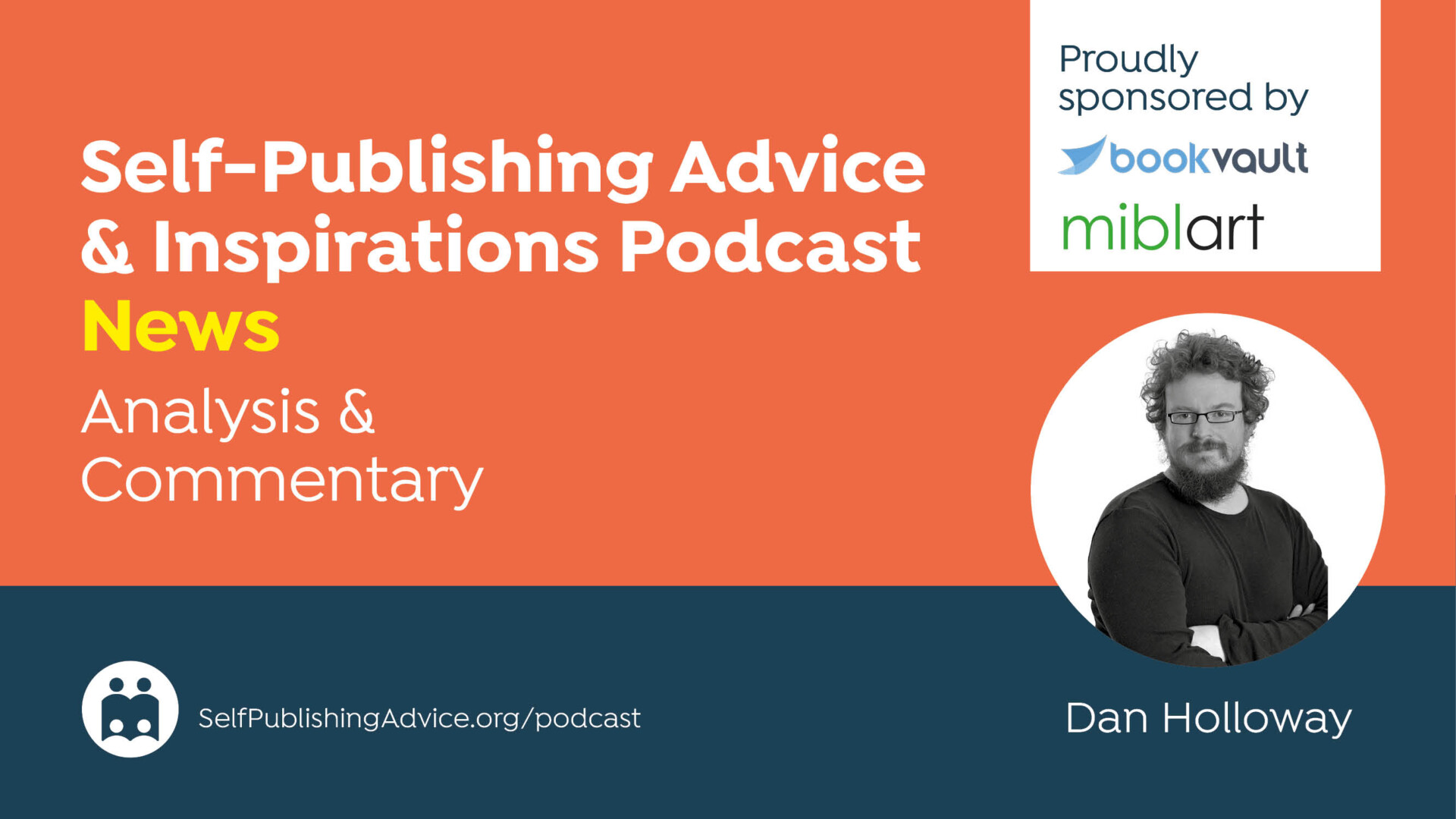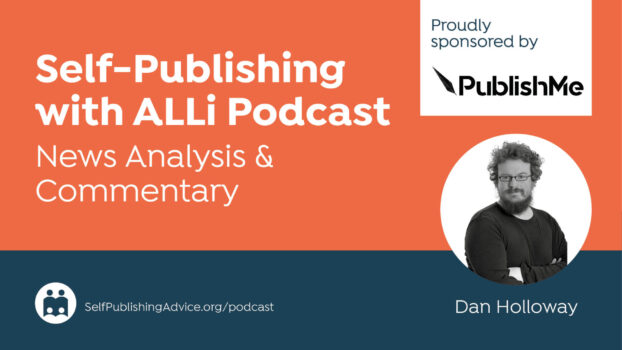On this episode of the Self-Publishing News Podcast, Dan Holloway covers the FTC's new measures against fake reviews, which could impact indie authors relying on genuine reviews for visibility. He outlines key points like the ban on AI-generated and paid reviews, along with potential fines. Dan also discusses the latest sustainability efforts in publishing and the addition of a gaming category to the Sunday Times Rich List, highlighting the growing link between gaming and storytelling.
Sponsors
Self-Publishing News is proudly sponsored by Bookvault. Sell high-quality, print-on-demand books directly to readers worldwide and earn maximum royalties selling directly. Automate fulfillment and create stunning special editions with BookvaultBespoke. Visit Bookvault.app today for an instant quote.
Self-Publishing News is also sponsored by book cover design company Miblart. They offer unlimited revisions, take no deposit to start work and you pay only when you love the final result. Get a book cover that will become your number-one marketing tool.
Thoughts or further questions on this post or any self-publishing issue?
If you’re an ALLi member, head over to the SelfPubConnect forum for support from our experienced community of indie authors, advisors, and team. Simply create an account (if you haven’t already) to request to join the forum and get going.
Non-members looking for more information can search our extensive archive of blog posts and podcast episodes packed with tips and advice at ALLi's Self-Publishing Advice Center.
Listen to Self-Publishing News: FTC Cracks Down on Fake Reviews
In this week’s Self-Publishing News Podcast, @agnieszkasshoes discusses the FTC's new rules on fake reviews and what they mean for indie authors. He also covers sustainability initiatives in publishing. Share on XDon't Miss an #AskALLi Broadcast
Subscribe to our Ask ALLi podcast on iTunes, Stitcher, Player.FM, Overcast, Pocket Casts, or Spotify.
About the Host
Dan Holloway is a novelist, poet, and spoken word artist. He is the MC of the performance arts show The New Libertines, He competed at the National Poetry Slam final at the Royal Albert Hall. His latest collection, The Transparency of Sutures, is available on Kindle.
Read the Transcripts to Self-Publishing News
Dan Holloway: Hello and welcome to another Self-Publishing News podcast from Oxford, where I have just returned from one of my annual pilgrimages. So, the end of August is that time of year when the Mind Sports Olympiad takes place, which is sandwiched this year in between the Olympics and the Paralympics, and a reminder that the Mind is also something which has Olympics, and they are held, not every four years, but every year.
I have just come back from competing in the Creative Thinking World Championships, where, and I'm going to allow myself to say it, where I won my fifth gold medal. So, I have been a Creative Thinking World Champion now five times. It's fabulous to know that even at the age of 52 and after what can only be described as an, to coin a phrase that has been coined many times before, an anus horribilis. The brain still has what it takes, I can still create. And as a result, I don't feel a fraud talking to you here about just that, about being creative, being a creative as an indie writer. So, I will go into next year with a little bit more confidence.
But what of the news, the news that's to do with things of more interest than my exploits.
Federal Trade Commission Aims to Ban Fake Reviews
The big story this week that I came across is the plans of the Federal Trade Commission, the FTC in America, to really ramp up its measures against fake reviews. So, it is preparing rules which will ban fake reviews, and this is obviously something that has bothered a lot of companies.
Amazon has a long history of trying to handle fake reviews, as obviously do other companies who rely heavily on reviews for their recommendations to customers.
Obviously, not all has gone smoothly with Amazon in the past when it comes to fake reviews. A lot of people, a lot of indies, have found themselves on the wrong side of fake reviews. Sadly, there have been cases where authors have taken part in schemes that haven't been in accordance with the guidelines on reviews, and have done things that would fall foul of the reviews.
There have been other even higher profile cases and the cause of greatest annoyance where we have just got swept up in slightly blunt attempts, for want of a better word, to control fake reviews, which have led to blankets of reviews just being taken down including many that are not fake, and that has then had a big knock on impact on us, obviously, because we rely on our reviews for things like access to BookBub promotions, as well as general visibility and discoverability.
Anyway, the FTC document about this is 163 pages long. You can, if you want, go and read it. I usually say at this point, I would highly recommend you do so. I'm genuinely not sure that I do.
Fortunately, TechCrunch has a really good summary of those rules, and I have summarized the summary.
It's very straightforward. How it is going to play out in practice is, what I hope, going to be slightly more precision than past attempts to get rid of fake reviews. So, I hope this isn't going to lead to blanket actions that then catch everyone else up in their midst.
So, the key points, no fake reviews, obviously, and that includes those created by AI. This is something I found really interesting because I was on an author's forum the other day, and one of the real frustrations there is those Amazon reviews that sort of aggregate your other reviews using AI to say, readers have said about this title, and then give a little summary of what it thinks readers are saying about it, and it sounds like a review, it's created by AI.
So, is that going to be included in what is counted as a fake review? Who knows what it will actually play out as.
Number two, no paid for reviews, and this is obviously something that authors have fallen foul of in the past and ne'er do wells fall foul of all the time.
So, review schemes where you are offered X number of reviews for X dollars, and you cannot be either a seller or a buyer of these. On a similar note, no buying followers who then review you. So, don't use paid for bots to grab 10,000 followers on X and then have them write reviews for you.
That will be treated just as harshly, and if you have a connection with a product, you must declare it. So, that's something.
It's quite an interesting one because this is one of the ones that's caught indie authors out a lot in the past, is Amazon's terms and conditions clearly ban all things where you've got a connection with a product, or went through a phase where it was the case that you couldn't write reviews if you had a connection with the product, and so authors, because everyone in our group knows each other, authors couldn't write reviews for other authors, even if you'd read the book, even if you bought the book, loved the book, and read it. Amazon would still say, ah, but I see you have a connection to this person because you're friends on Facebook, whatever.
Now the rule makes it clear that if you have a connection with the product, you must declare it. It doesn't say that you are not allowed to write a review if you have a connection with the product.
The other thing is that it is much more serious than having your account suspended. There will be a fine of up to $50,000 if you are caught doing any of those things.
The devil as always will be in the detail. There is 163 pages of detail, but the real detail that matters is how this is put into practice, how it is policed, and importantly, how sites who rely on reviews, decide they are going to police it to avoid falling foul, and whether they take a blunt approach or a sharp approach, basically.
It will be fascinating to see how that plays out, and I will, of course, keep you up to date.
Publishing Industry Focuses on Sustainability
Other things that have been in the news, sustainability. Sustainability is something I haven't talked about for a little while. It's obviously something that publishing is becoming more and more aware of. This past week, Muddy Publishing became the 200th company to sign up to the UK Publishing Association's Publishing Declares initiative, which is part of the wider Publishers Compact under the UN Sustainable Development Goals.
This is basically a declaration to do everything you can to, in particular, minimize the impact of supply chain problems. We all know that supply chain is where we have some issues in our industry. We also know that indies are better than most when it comes to supply chain, largely because we tend to focus on digital products, and when we use print, we tend to use print on demand, which has a much less high impact on sustainability than the process of returns, which has been used for so many years.
So, it's interesting that campaign has reached such a milestone.
Sunday Times Rich List Highlights Creatives
Other milestones that are interesting, the Sunday Times Rich List. This is an annual publication of the richest people, and that could be the richest people in the world, or it could be the richest people in a particular sphere. For the first time this year it has published a rich list in of people in gaming, which I found interesting because gaming is something that I often talk about in relation to the publishing world, as being one of those exciting places where great storytellers can go and apply their wares, and do so developing the world building and character arc skills. This shows that there really is a great audience for people who write games and also people who talk about games.
Far and away the richest people on the list are the Bukhmans, of a company called Playrix, but there are lots of other people who've got rich as a result of development of games, so games like Candy Crush, Grand Theft Auto, Minecraft. But there are also gamers and YouTubers who talk about games. So, there are people in front of the camera who are creatives, and there are people who write who are creatives.
So, it's an area that is now considered developed enough to have its own rich list, so make of that what you will, but it is always interesting.
I've got this far without really talking about AI, that feels like a very good thing to have achieved. There is some AI in the news this week, but it is largely just thinking about, or looking forward to, Frankfurt where there will be a lot of talk about AI.
I will leave it until then to bring you the news after it has happened and leave you this week with news that it is relatively AI free, but which has some things, obviously, as I say with the FTC's new steps, that we need to think about, and we need to very much have on our horizon.
I look forward to speaking to you again next week when I won't have just travelled back from London and be absolutely exhausted, and have my head spinning full of things such as a potentially interesting transgenic animal experiment.
So, this was a fabulous question I'll leave you with. We were introduced to the question by the experiment of the US military, I think.
To put spider silk genes into goats in the hope that goat milk would contain something that could then be spun into a mass production version of silk that could be used as protective vests for the military. This didn't work out so well, but we were asked to come up with ideas for qualities of one animal that could be spliced into another animal that would be super cool and would benefit the animals in question, and would maybe benefit the whole of the planet and all animals and species on it.
So go away, have a think about that, get your juices flowing, and I hope that leads to many wonderful ideas for you. Thank you very much, as always.





